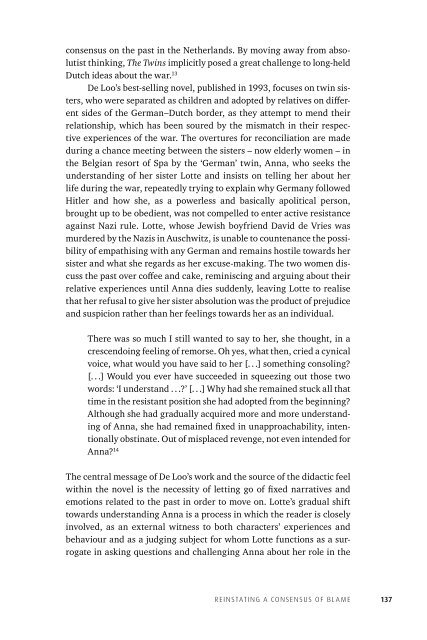Discord Consensus
7aze300jFJo
7aze300jFJo
Create successful ePaper yourself
Turn your PDF publications into a flip-book with our unique Google optimized e-Paper software.
consensus on the past in the Netherlands. By moving away from absolutist<br />
thinking, The Twins implicitly posed a great challenge to long-held<br />
Dutch ideas about the war. 13<br />
De Loo’s best-selling novel, published in 1993, focuses on twin sisters,<br />
who were separated as children and adopted by relatives on different<br />
sides of the German–Dutch border, as they attempt to mend their<br />
relationship, which has been soured by the mismatch in their respective<br />
experiences of the war. The overtures for reconciliation are made<br />
during a chance meeting between the sisters –now elderly women –in<br />
the Belgian resort of Spa by the ‘German’ twin, Anna, who seeks the<br />
understanding of her sister Lotte and insists on telling her about her<br />
life during the war, repeatedly trying to explain why Germany followed<br />
Hitler and how she, as a powerless and basically apolitical person,<br />
brought up to be obedient, was not compelled to enter active resistance<br />
against Nazi rule. Lotte, whose Jewish boyfriend David de Vries was<br />
murdered by the Nazis in Auschwitz, is unable to countenance the possibility<br />
of empathising with any German and remains hostile towards her<br />
sister and what she regards as her excuse-making. The two women discuss<br />
the past over coffee and cake, reminiscing and arguing about their<br />
relative experiences until Anna dies suddenly, leaving Lotte to realise<br />
that her refusal to give her sister absolution was the product of prejudice<br />
and suspicion rather than her feelings towards her as an individual.<br />
There was so much I still wanted to say to her, she thought, in a<br />
crescendoing feeling of remorse. Oh yes, what then, cried a cynical<br />
voice, what would you have said to her [. . .] something consoling?<br />
[. . .] Would you ever have succeeded in squeezing out those two<br />
words: ‘I understand . . .?’ [. . .] Why had she remained stuck all that<br />
time in the resistant position she had adopted from the beginning?<br />
Although she had gradually acquired more and more understanding<br />
of Anna, she had remained fixed in unapproachability, intentionally<br />
obstinate. Out of misplaced revenge, not even intended for<br />
Anna? 14<br />
The central message of De Loo’s work and the source of the didactic feel<br />
within the novel is the necessity of letting go of fixed narratives and<br />
emotions related to the past in order to move on. Lotte’s gradual shift<br />
towards understanding Anna is a process in which the reader is closely<br />
involved, as an external witness to both characters’ experiences and<br />
behaviour and as a judging subject for whom Lotte functions as a surrogate<br />
in asking questions and challenging Anna about her role in the<br />
Reinstating a consensus of blame 137


